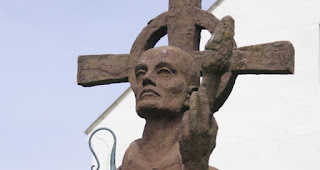As we progress through Lent we will share in a series of planned preaching taken from the Gospel lectionary. In the weeks leading up to each of the five Sundays we will contemplate the elements of the text. We start with the Temptations of Jesus. Why not start by reading the account from Luke’s Gospel 4:1-13
The first temptation was to turn stones into bread. This wilderness was not a wilderness of sand. It was covered by little bits of limestone exactly like loaves. The tempter said to Jesus, "If you want people to follow you, use your wonderful powers to give them material things." He was suggesting that Jesus should bribe people into following him. Back came Jesus' answer in a quotation of Deuteronomy 8:3 . "people need more than food to live—they need every word that the Lord has spoken.."
Jesus, like Moses before him, retreats into the wilderness where he fasts for forty days. Each temptation involves a seizure of power: this first temptation the power over the elements of creation by turning stones into bread. That Jesus was tested throughout his ministry was widely held in early Christianity. The Letter to the Hebrews tells us, "For do we not have a high priest (Jesus) who is unable to sympathise with out weakness, but we have one who in every respect has been tested as we are, yet without sin."
John Wesley said, “As the most dangerous winds may enter at little openings, so the devil never enters more dangerously than by little unobserved incidents, which seem to be nothing, yet insensibly open the heart to great temptations.”
Lord, you told of these temptations to your disciples - how else would they have known? Can I put words on my own temptations, the weaknesses or wickedness that draw me in particular? Can I see my temptations as you did, against the backdrop of the vocation to which you call me?
This day
and every day
as we face the day
daunted by expectations
others place upon us,
weighed down by burdens,
unsure of outcomes,
opposed,
alone,
afraid,
remind us
that you faced all this
and more,
that we might loose
the chains that bind us,
rise above and beyond
the troubles of this world,
and know peace
in your embrace. Amen
















